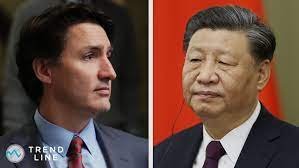The already tense diplomatic relations between Canada and China reached a new low as a result of recent events that unfolded between the two countries. The situation escalated when Beijing expelled a Canadian diplomat in response to Ottawa’s decision to ask a Chinese envoy to leave Canada. The Canadian government had taken this action after accusing the Chinese diplomat of targeting a Canadian lawmaker who had been critical of China’s human rights record.
On Monday, the government led by Prime Minister Justin Trudeau declared Chinese diplomat Zhao Wei as “persona non grata.” This term essentially means that Zhao Wei is no longer welcome in Canada and must leave the country. In response, China swiftly retaliated by asking Jennifer Lynn Lalonde, a high-ranking diplomat in the Canadian consulate in Shanghai, to leave China by May 13. This series of actions and counteractions between the two nations led to a significant escalation of tensions.
China’s response to Canada’s decision was accompanied by a warning that it retained the right to take further actions in the future. This statement hinted at the potential for more severe consequences in the diplomatic relationship between the two countries. However, Prime Minister Trudeau was resolute in his response, asserting that Canada would not be intimidated by China’s actions.
The expulsion of diplomats and the subsequent war of words between Canada and China highlighted the deepening strains in their relations. These tensions can be attributed to a variety of issues, including trade disputes, human rights concerns, and differing geopolitical interests. The situation has been further exacerbated by the ongoing detention of two Canadians, Michael Kovrig and Michael Spavor, in China since 2018, which Canada sees as retaliation for the arrest of Huawei executive Meng Wanzhou in Vancouver.
The strained relationship between Canada and China has significant implications for both countries. Canada has relied on China as a major trading partner, particularly in sectors such as agriculture, natural resources, and technology. The deteriorating relations have raised concerns about the potential impact on Canadian businesses and the economy as a whole.
Moreover, the diplomatic rift has also had a significant impact on individuals caught in the crossfire. The detention of Kovrig and Spavor has been a source of great concern for their families and for Canada. Efforts to secure their release have been ongoing, but progress has been limited, with China insisting that the case is a matter of its own domestic affairs.
The events of the recent diplomatic fallout serve as a reminder of the complex dynamics at play between Canada and China. Balancing economic interests, human rights concerns, and national security considerations is a delicate task for both nations. As tensions continue to rise, it remains to be seen how the situation will unfold and what further actions each country may take.
In the face of China’s warning and Canada’s firm stance, the diplomatic impasse between the two countries shows no signs of quick resolution. The international community will closely watch how these developments unfold and their broader implications for global diplomacy and geopolitics.


